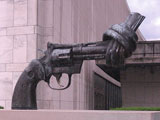START: Russia Ready to Deal
By Sergei Blagov for ISN
Russian and US negotiators appear optimistic following 24 April talks in Rome aimed at creating a new treaty to reduce their nuclear weapon stockpiles.
After a one-day meeting in Rome on 24 April, negotiators said they held a "very productive" initial round of talks. Russian negotiator Anatoly Antonov said Moscow would do "everything possible" to prepare a new draft treaty by year-end, and that the new treaty would serve to improve bilateral relations, with negotiations set to resume in May.
The goal of the talks was to find a replacement for the landmark Cold War-era nuclear arms control treaty, the 1991 Strategic Arms Reduction Treaty (external page START). Under a new deal, Russia and the US were understood to be considering cutting their nuclear arsenals by half.
Even before bilateral talks started, the Kremlin appeared keen to demonstrate its willingness to pursue nuclear disarmament. On 20 April, President Dmitry Medvedev announced Russia was prepared to make more serious cuts to its strategic arsenal than it had previously pledged. However, he made it clear that Moscow would accept arms reduction only in exchange for a ban on strategic arms deployment in space. Medvedev also said Russia would aim to limit not only missiles and strategic bombers, but warheads as well.
Russia's top military official echoed these sentiments, saying the country was prepared to "significantly" cut its nuclear arsenal if a deal was reached with the US. On 23 April, General Nikolai Makarov, chief of General Staff of the Russian army, said Russia could cut its nuclear arsenal to levels lower than stipulated by the Moscow Treaty of 2002, which envisaged cuts down to 1,700-2,200 nuclear warheads. Moscow also insists that any strategic arms reduction agreement with Washington should be linked with the issue of the US missile defense in Europe.
Indeed, negotiating a successor part to START-1, due to expire on 5 December, has proven a major challenge.
In Russia, moves toward nuclear disarmament are not universally popular. On 21 April, opposition Communist Party lawmaker Vladimir Kashin warned against cutting the country’s nuclear arsenal, arguing that significant arms reductions could seriously undermine the strategic deterrent. He urged the Kremlin to withdraw from the nuclear test ban treaty and resume nuclear tests.
Russian officials have also warned against inflated expectations over disarmament talks. On 21 April, Deputy Foreign Minister Sergei Ryabkov said Russia did not expect any "supernatural" strategic arms cuts, commenting on speculations that both nations were prepared to cut the number of nuclear warheads below 1,000 level. Ryabov also argued that it would be "counterproductive" to invite other nuclear nations to join arms reduction talks.
What we can conclude from the Rome talks, for which very little was revealed other than that they were “very productive,” is that while Russia seems prepared to deal, its perceived attempt to link strategic arms cuts and the issue of US missile defense in Europe place the ball in Washington’s court. It is unclear at this point whether the new US administration will play along. This, combined with opposition to the deal among certain circles in Russia, is likely to render bilateral negotiations a long and arduous process.
